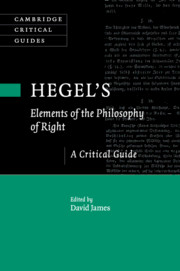Book contents
- Frontmatter
- Contents
- List of Contributors
- List of Abbreviations
- Introduction: Freedom and History in Hegel's Philosophy of Right
- 1 The Method of the Philosophy of Right
- 2 Property, Use and Value in Hegel's Philosophy of Right
- 3 Hegel on Morality
- 4 Hegelian Conscience as Reflective Equilibrium and the Organic Justification of Sittlichkeit
- 5 Living the Contradictions: Wives, Husbands and Children in Hegel's Elements of the Philosophy of Right
- 6 ‘The Ethicality in Civil Society’: Bifurcation, Bildung and Hegel's Supersession of the Aporias of Social Modernity
- 7 Why Ethical Life is Fragile: Rights, Markets and States in Hegel's Philosophy of Right
- 8 That Which Makes Itself: Hegel, Rabble and Consequences
- 9 Practical Necessity and the ‘Logic’ of Civil Society
- 10 How Modern is the Hegelian State?
- Bibliography
- Index
5 - Living the Contradictions: Wives, Husbands and Children in Hegel's Elements of the Philosophy of Right
Published online by Cambridge University Press: 16 March 2017
- Frontmatter
- Contents
- List of Contributors
- List of Abbreviations
- Introduction: Freedom and History in Hegel's Philosophy of Right
- 1 The Method of the Philosophy of Right
- 2 Property, Use and Value in Hegel's Philosophy of Right
- 3 Hegel on Morality
- 4 Hegelian Conscience as Reflective Equilibrium and the Organic Justification of Sittlichkeit
- 5 Living the Contradictions: Wives, Husbands and Children in Hegel's Elements of the Philosophy of Right
- 6 ‘The Ethicality in Civil Society’: Bifurcation, Bildung and Hegel's Supersession of the Aporias of Social Modernity
- 7 Why Ethical Life is Fragile: Rights, Markets and States in Hegel's Philosophy of Right
- 8 That Which Makes Itself: Hegel, Rabble and Consequences
- 9 Practical Necessity and the ‘Logic’ of Civil Society
- 10 How Modern is the Hegelian State?
- Bibliography
- Index
Summary
Introduction
This essay focuses on Hegel's discussion of the family as an essential component of modern ethical life in Elements of the Philosophy of Right. Hegel's arguments about the nature of marriage, the sexual division of labour within the family, the relation between parents and children and the necessary role of the family in relation to state and civil society have inspired a range of sympathetic and critical responses. Many such responses point to ways in which aspects of his arguments appear to put the ethical life of the family at odds with Hegel's broader narrative of the realization of freedom in the development of the modern state. It will be argued here that Hegel's presentation of the ways in which the family relates to both civil society and the state undercuts the possibility of reading this relation in a linear or hierarchical fashion in which either the family is subsumed by civil society, or the state satisfactorily resolves contradictions and tensions between the other two spheres. In this respect, Hegel not only shows us how the modern market state sustains and is sustained by certain kinds of personal relations and self-identities, but also reveals fault lines that threaten its stability. These are fault lines that challenge the temporal and spatial distinctions through which, on Hegel's own account, the specificity of the modern family is secured. They suggest that there is more at stake in Hegel's argument than a functional account of how the family serves the higher purposes of the state.
The argument of the essay proceeds as follows. First, I offer a reading of Hegel on the family, which highlights his emphasis on the novelty of the nature of the family within modern ethical life. Second, I demonstrate how Hegel's account of this new kind of family is haunted and destabilized by a series of tensions in his analysis relating to the distinctions and transitions he traces between kinship and family (marriage); family and civil society (property); family and state (education).
- Type
- Chapter
- Information
- Hegel's Elements of the Philosophy of RightA Critical Guide, pp. 97 - 115Publisher: Cambridge University PressPrint publication year: 2017



